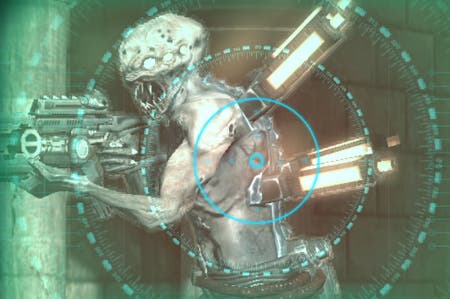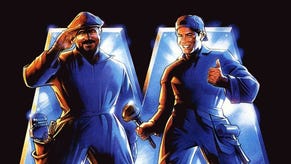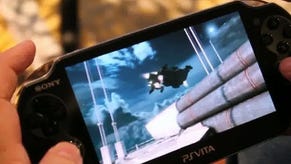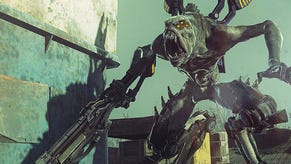Resistance: Burning Skies Review
Missed target.
The Resistance series made its mark by tearing up the history books and rewriting the script on 20th-century conflict. Now, for its Vita debut, the concept has been taken to weirdly literal lengths in a game that seems to go out of its way to pretend the 21st Century never really happened for the first-person shooter.
Which is an odd thing to say about the first full-fat, high-definition FPS ever to appear on a handheld gaming console - and certainly not what I hoped to be writing
The tantalising appeal of Vita for many gamers was never really anything to do with the touch panels, cameras, motion sensors, 3G connectivity or any of that bullet-point-bingo frippery (as compelling as some of those features are when smartly deployed). No, it was simply those two analogue sticks, either side of the screen, that promised core console gaming without compromise.
The good news, such as it is, is that it works. Here's proof positive that Vita can deliver a proper FPS experience on the move, with twin-stick control and lag-free online multiplayer. The bad news, as you may have divined several paragraphs ago, is that Burning Skies is not the great shooter we've been waiting for.
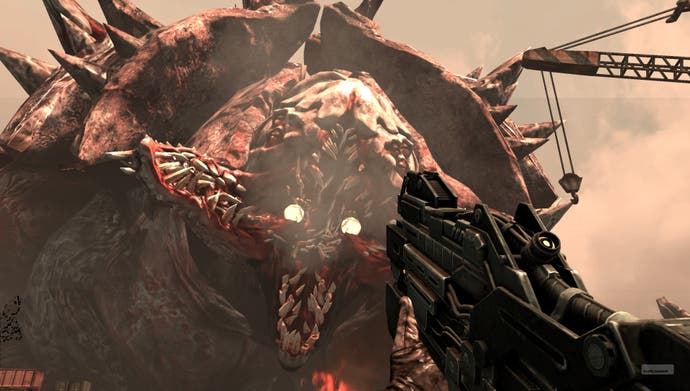
It's the little things that add up, one by one, to an often hypnotically bland, slapdash campaign. The core is sound enough, but Burning Skies is far too shabby in places for what is supposed to be the flagship first-party shooter on the Vita - indeed, the flagship shooter on handhelds, full stop.
Perhaps, as I suggested above, the single-player is in fact an elaborate meta-joke in which we travel back to gaming's past to experience the rough edges, brain-dead AI, clumsy scripting and general absence of finesse that today's elite shooters - including the trio of Resistance titles on PS3 - left behind in a previous generation. Better to believe that than to swallow the bitter truth that says this is really the best Sony could have done with Vita's first shooter.
Burning Skies is set in 1951, within the series' established narrative universe. You play the role of fire-fighter Tom Riley, whose family is whisked away during the Chimera invasion of the east coast of the US.
While there's some half-decent voice acting in there - notably Ellie, the woman who fights by your side for much of the game - mostly it's of standard video game quality, by which I mean it's rubbish. Having just played through Max Payne 3 with the endless and amusing mutterings-to-self of its protagonist, Riley's rare lines never come close to establishing a rounded, interesting lead.
I'm probably being unfair, as 'lack of character' is a criticism that could be levelled at the vast majority of supposedly character-driven action games, including the bemusing nonsense that constitutes Call of Duty's ongoing fiction. The problem here, though, is that I was forced to focus on it far more than I would in something like COD, because there was often little else to capture my attention. It took a while to figure it out why - but once I did it was like a hideous wart on someone's face you cannot take your eyes off, however hard you try. Burning Skies, for great swathes of the campaign, is simply devoid of atmosphere.
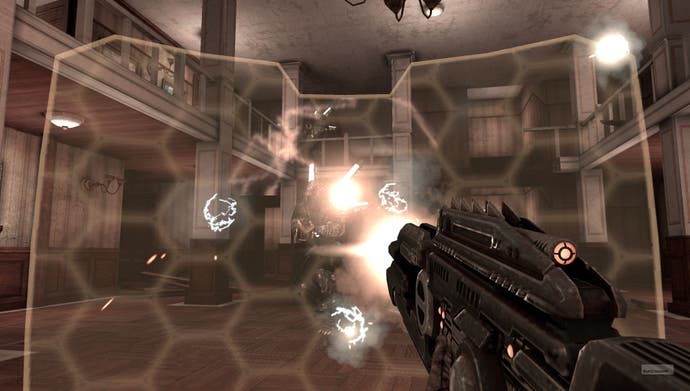
It's so darned odd I thought it was a bug at first: one which had killed the music. But no, it turns out that the musical score - a collection of actually very nicely done orchestral flourishes - only plays out during certain sequences. The rest of the time it's just your footsteps, the sound of gunfire and mood-killing silence.
As a creative option, silence can be just as effective as cacophony at the right moment. But as the default ambience? It's like walking through a tech demo at times, not a compelling game world.
The shooting action is interspersed with short scripted sequences triggered when Riley walks past a certain point, or clears an area of Chimera. Which is fine, until you find yourself in the right place at the wrong time and a scene won't trigger until you find that Chimera stuck around a corner.
While I could spend all day banging on about the game's shortcomings, there are parts of it that I genuinely enjoyed. Mostly, those parts are the weapons you accumulate as you progress, which have always been the series' strength.
Controls are standard FPS issue - a lovely thing on a handheld - with a twist to accommodate the lack of additional shoulder and stick buttons. The run command, for instance, is activated either by tapping down on the d-pad (not ideal) or double-tapping the rear touch pad, something that quickly becomes second nature.
Touch-screen implementation is mostly well done; I'm a big fan of the swipe-and-target grenade control, and melee is performed via a touch panel sensibly placed on the right side of the screen. (It was a needlessly poor design decision, however, to require a precise touch of the screen to open doors, which all too often results in setting off secondary fire by mistake.)
The series' excellent weapon wheel returns, offering eight firearms, each with two firing options and six possible upgrades, only two of which can be enabled at any one time. It's familiar stuff if you've played previous instalments, but nonetheless great fun to play around with. But it's wasted in single-player, with AI that rarely surprises beyond occasionally overwhelming in numbers. It's a different story in multiplayer.
It's not big or particularly clever - there are three modes, Deathmatch, Team Deathmatch and Survival, for up to eight players, with teams of four. But, crucially, it works. This is more than a novelty on a handheld - it's a revelation years in the waiting.
I haven't experienced any noticeable lag whatsoever in the matches I've played, and while the frame rate dips at times, it's never to the point where it ruins things. Weapons and upgrades are unlocked as you level up, at which point you can really put these tools through their paces in a competitive environment. It's clearly short of the feature-packed polish of home consoles' premier online shooters, with a limited supply of maps, basic leaderboards and no voice chat, but it's an encouraging start for Vita, and bodes very well for what will come in the future.
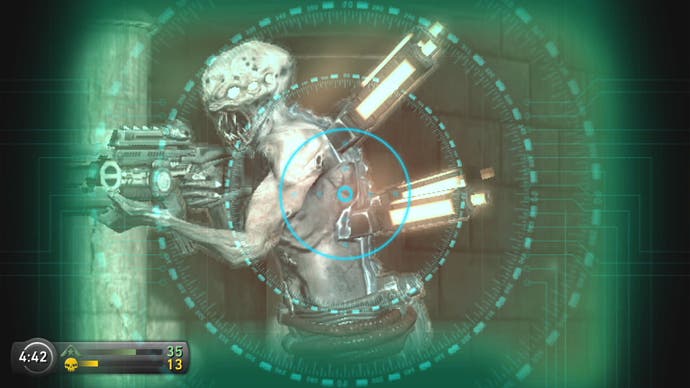
But we're talking about the present, and while Resistance is evidence that the genre has finally found a suitable home on handheld, too much of what's on offer here isn't of a high enough standard.
And here's the bigger problem for Sony: if it wants people to take Vita seriously as a high-end entertainment device that's in it for the long haul, it's not enough to bring its biggest franchises to the platform - it needs its best talent to be making the games, too. Burning Skies, like many other handheld instalments of key Sony series, was not made by the original studio (in this case, the developer was Nihilistic rather than Insomniac). In other words, we're too often being asked to pay triple-A prices for games made by the B-team.
That's not to suggest other studios are incapable of coming up with the goods, which would be unfair. Bend did an excellent job on Uncharted, for instance. But the broader perception matters. I know of at least one major Sony studio making a Vita title (as yet unannounced), but there should be more. The platform holder should be leading by example.
As it stands, for all its problems, Resistance: Burning Skies also has its moments of fun - and in the enjoyable if thin multiplayer, it offers an experience hitherto unavailable in portable gaming. That will be enough for some, for now, but we should demand much more.
